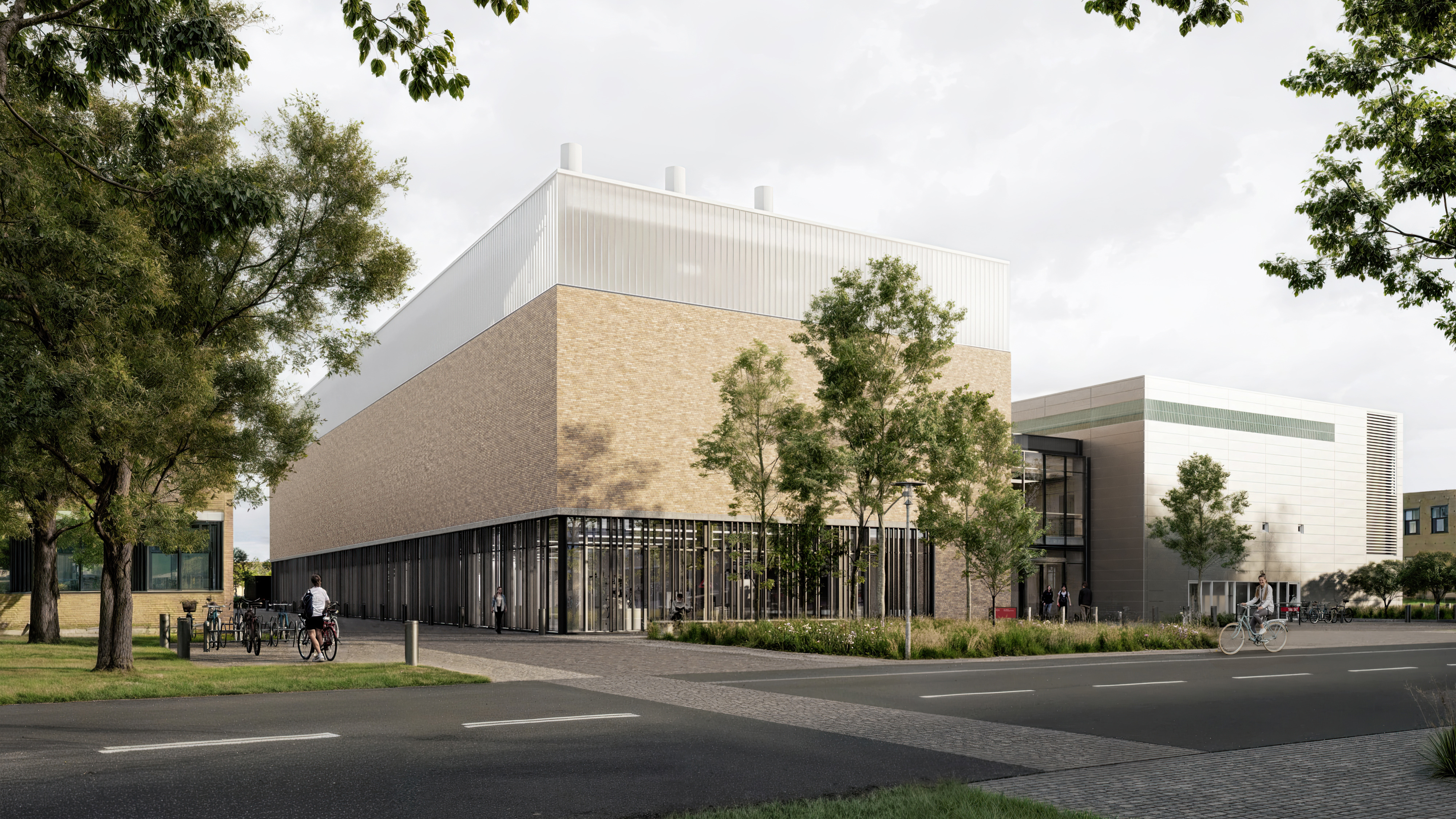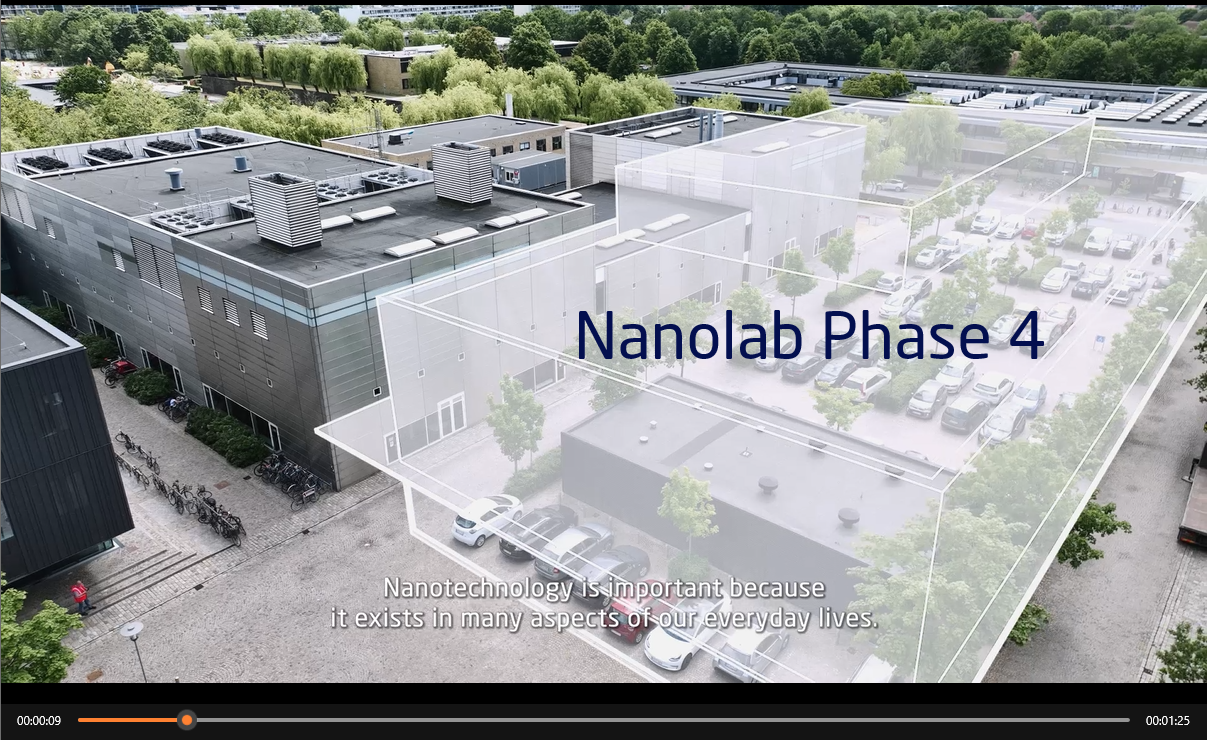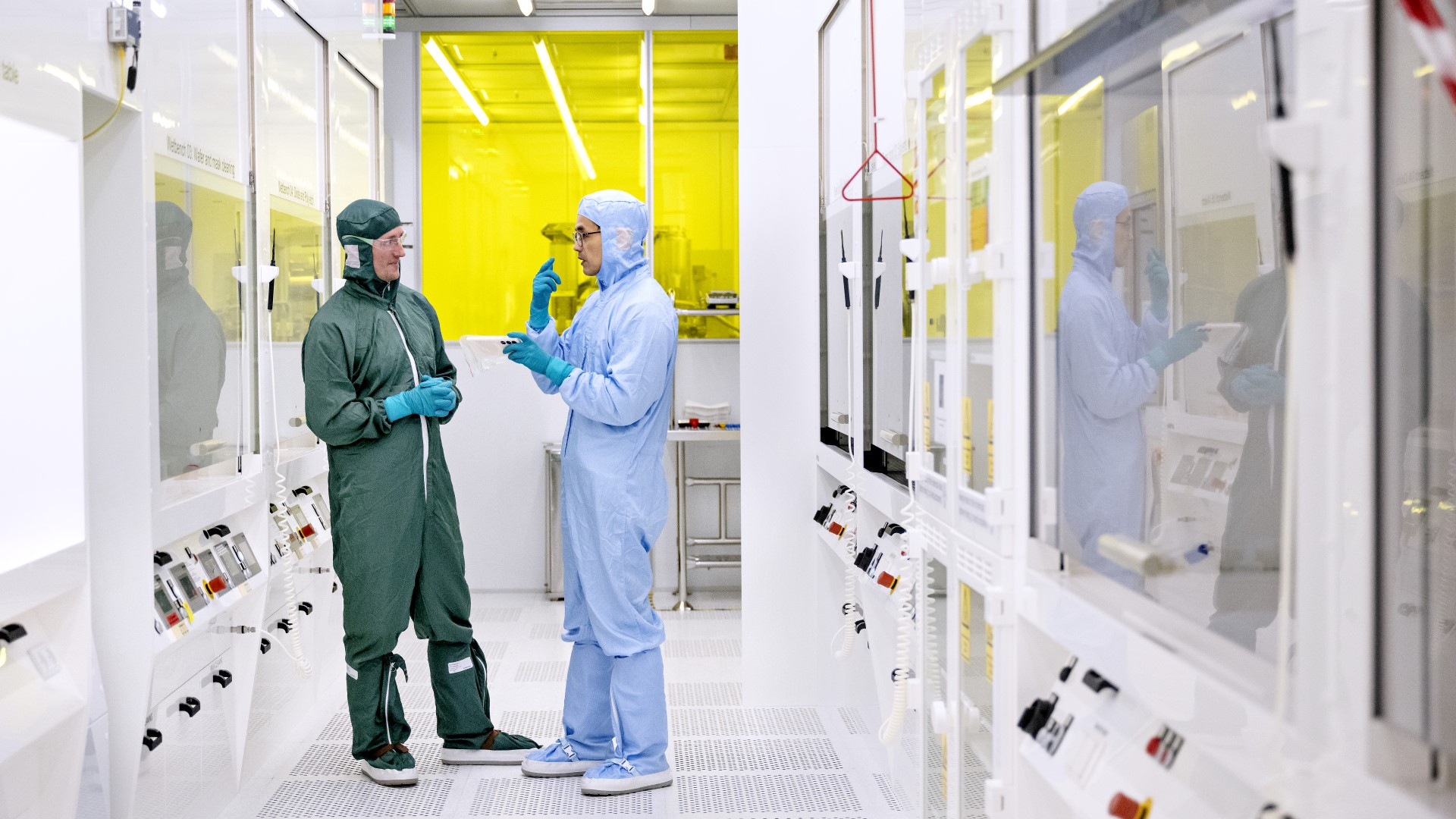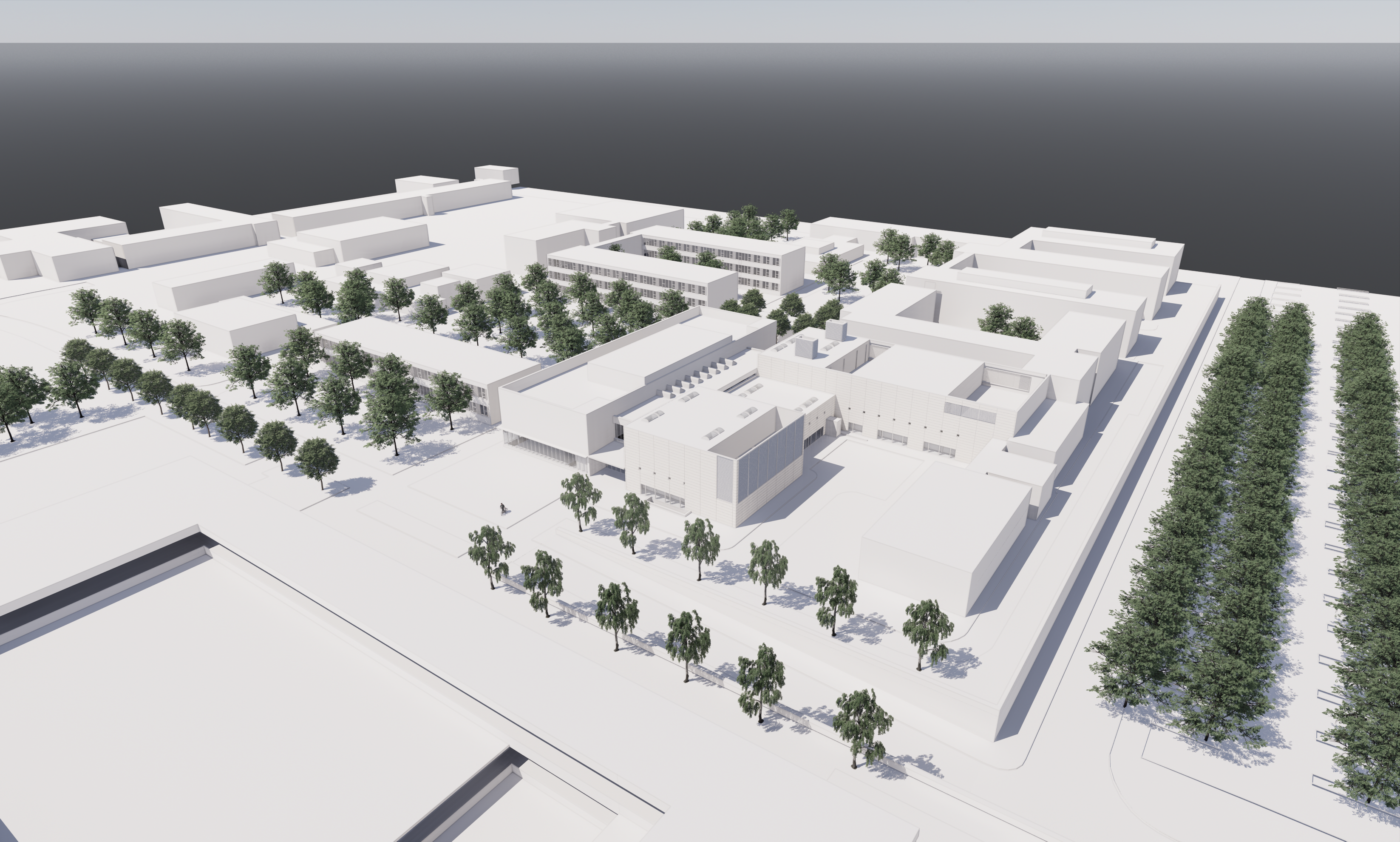Nanolab PHase 4 - nyt renrum (b346A)

Om Nanolab Phase 4
Ny bygning til nanofabrikation på DTU Lyngby Campus
Nanoteknologi er nøglen til fremtidens teknologi
Nanoteknologi er essentiel for vækst og sikkerhed i Danmark. Ved at anvende nanoteknologi udvikler forskere og virksomheder nye teknologier og produkter såsom materialer og bittesmå komponenter, der bliver brugt i alt fra computerchips, optiske linser i mobiltelefoner til måling på biologiske celler. Alt sammen vigtige kompotenter inden for sundhed, kunstig intelligens, it og life-science.
DTU Nanolab, Nationalt Center for Nanofabrikation og -karakterisering, understøtter udviklingen af dansk nanoteknologi. I dag har DTU Nanolab renrum – dvs. avancerede laboratoriefaciliteter – til mikro- og nanofabrikation, som forskere bruger, og som samarbejdspartnere kan leje sig ind i.
Behov for mere plads
I dag er der ca. 400 brugere, heriblandt forskere fra 7 af DTU’s 8 grundforskningscentre, som bruger DTU Nanolabs faciliteter. Men de eksisterende renrums maksimumkapacitet er nået. Der er behov for nye, tidssvarende laboratorier og maskiner, hvis DTU Nanolab skal imødekomme efterspørgsel fra samarbejdspartnere eller søsætte større forskningsaktiviteter.
Nu opfører DTU bygningen B346A med nye state-of-the-art forskningsfaciliteter. Med B346A udvider DTU Nanolab sine faciliteter med ca. 700 m2 renrum designet til at huse den seneste generation af udstyr til nanofabrikation. Det vil give samarbejdspartnere, forskningsprojekter og nye initiativer adgang til de nødvendige og unikke faciliteter, der er brug for i Nordeuropa.
Et komplekst laboratoriebyggeri
I renrum har man et ekstremt kontrolleret miljø, hvor man styrer temperatur, luft og fugtighed, hvilket er nødvendigt for at bedrive højteknologisk eliteforskning i nano- og kvanteteknologi.
DTU har som mål at designe og opføre B346A med de nyeste bæredygtige løsninger. Et vigtigt fokus er at skabe fleksible og fremtidssikrede renrum, der kan tilpasses nye teknologier og faciliteter, der kan bruges døgnet rundt, året rundt, med det lavest mulige energiforbrug.
Samlingspunkt og udstillingsvindue
Med B346A sikrer DTU, at DTU Nanolab kan fremtidssikre DTU’s verdensførende forskningsinfrastruktur inden for mikro- og nanofabrikation. Vigtigst bidrager DTU til, at Danmark kan levere de nødvendige komponenter til at udvikle fremtidens teknologier.
Visionen for B346A er at skabe et inspirerende og innovativt internationalt forskningsmiljø, der samler forskere, studerende og samarbejdspartnere på tværs af fag. Samtidig skal B346A blive et udstillingsvindue, hvor alle kan opleve og få viden om den nyeste nanoteknologi.
About Nanolab Phase 4
New building for nanofabrication at DTU Lyngby Campus
Nanotechnology is essential for economic growth and security in Denmark. The use of nanotechnology has allowed researchers and companies to develop new technologies and products such as novel materials and tiny components. These are used in a variety of products including computer chips, optical lenses in mobile phones and for measuring cells. These are all important components within artificial intelligence, IT and life sciences.
DTU Nanolab, the National Centre for Nano Fabrication and Characterization, supports the development of Danish nanotechnology. Today, DTU Nanolab has a cleanroom – i.e. an advanced laboratory facility – for micro- and nanofabrication. This is used by both university researchers and commercial partners who can rent a workspace.
Need for more space
There are approx. 400 researchers, including those from 7 out of DTU's 8 basic research centres, who use DTU Nanolab's facilities. But the maximum capacity of the cleanrooms has been reached. There is a need for new, up-to-date laboratories and tools if DTU Nanolab is to meet demands from collaboration partners or to launch major research activities.
DTU is constructing building B346A with new state-of-the-art research facilities. DTU Nanolab will expand its facilities with an approximately 700 m2 cleanroom, designed to house the latest generation of nanofabrication equipment. This will give collaboration partners, research projects and new initiatives access to the essential and unique facilities needed in Northern Europe.
Complex laboratory construction
A cleanroom creates a controlled environment where temperature, particle count and humidity are regulated which allows high-tech research in key nano and quantum technologies.DTU Campus Service (CAS), the department constructing the building, aims to design and construct B346A with the latest sustainable solutions. An important focus is to create flexible and future-proof cleanrooms, adaptable to new technologies and facilities, that can be used around the clock, throughout the whole year, with the lowest energy consumption possible.
Meeting place and shop window
DTU has ensured that DTU Nanolab can future-proof DTU's world-leading research infrastructure within micro- and nanofabrication. Most importantly, DTU will contribute to Denmark being able to supply the necessary components for future technologies.
The vision for B346A is to create an inspiring and innovative international research environment that brings researchers, students, and collaboration partners across disciplines together. Simultaneously, B346A will become a showcase where everyone can experience and gain knowledge about the latest nanotechnology.

Nanolab Phase 4 billeder til download
Videos of Nanolab Phase 4
Nanolab Phase 4 posters til download
Nanolab Phase 4 FAQ
FAQ om B346A - DTU's nye bygning til nanofabrikation
DTU Nanolab, Nationalt Center for Nanofabrikation og -karakterisering, forsker i og giver adgang til avanceret udstyr og ekspertise inden for mikro-og nanoteknologi. Med placeringen på DTU Lyngby Campus spiller DTU Nanolab en central rolle i udviklingen af mikro- og nanoteknologi i Danmark.
DTU Nanolab driver og vedligeholder state-of-the-art udstyr og renrumsfaciliteter. Det gør vi for at sikre åben adgang til optimale arbejdsbetingelser for forskere og samarbejdspartnere.
Se mere på DTU Nanolabs web: https://www.nanolab.dtu.dk.
Entreprenør er endnu ikke valgt.
FAQ about B346A - DTU's new building for nanofabrication
DTU Nanolab, National Center for Nano Fabrication and Characterization, researches micro- and nanotechnology and provides access to advanced equipment and expertise within the field. With its location on DTU's campus in Lyngby, DTU Nanolab plays a central role in the development of micro- and nanotechnology in Denmark.
DTU Nanolab operates and maintains state-of-the-art equipment and cleanroom facilities. We do this to ensure open access to ideal working conditions for researchers and collaboration partners.
See more on DTU Nanolab's website https://www.nanolab.dtu.dk.
Nyhedsbreve
Følg med i byggeriets udvikling i vores nyhedsbreve
Kontakt
Nanolab Phase 4
Anders M. Jørgensen Deputy Director, Ph.D.
Nanolab Phase 4
Jörg Hübner Director, Ph.D.
Nanolab Phase 4
Troels Lysgaard-Hansen Project Manager
Nanolab Phase 4
Elsebeth Hauerslev Kjærgaard Project Manager












